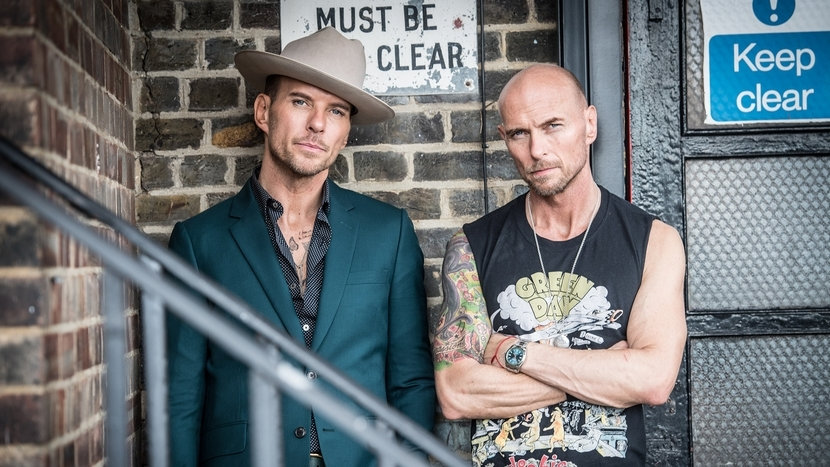Looking back on the boyband Bros's brief, late Eighties prominence in the UK, you notice the chippiness of their songtitles: "When Will I Be Famous?" (calm down, mate), "I Owe You Nothing" (hang on), "Drop the Boy" (please wouldn't go amiss), "I Quit" (well, screw you, too). Unlike ingratiating "The Harder I Try" hitmakers Brother Beyond or too-cool-for-school, Andy Warhol-courting hipsters Curiosity Killed the Cat, these guys were worked up about something, and very nearly as exercised as their permanently hollering fans: you can hear it in that bizarre, hernia-inducing "ugh-oh" noise singer Matt Goss emits directly after he sings about how little he owes us, and again in some of the notes he pushed for on the group's 1988 cover of "Silent Night". ("Push" would be the title of the group's debut album: in retrospect, it fits perfectly.) After the Screaming Stops, a document of the band's 30th anniversary reunion concert in London, suggests that edge hasn't entirely vanished: within thirty seconds, we're watching Matt threatening to lamp his twin brother Luke backstage at This Morning. Luke, of course, has spent the intervening decades carving out a presumably profitable if not much feted career in genre movies (most prominently as the villain in Blade II); Matt has clung to his original musical dream, decamping to Vegas for a residency as a crooner that has made this reunion event viable. Their differences, however, may be irreconcilable: where others once screamed at them, now they scream at one another. There is, if you will, a very real cat among these pigeons.
Even if directors Joe Pearlman and David Soutar had had an inkling of the tension between the brothers, they were surely taken aback by the extent of the enmity - it's why they put that first blazing row upfront. (It announces: hold onto your denim jackets.) Very quickly, the film asserts itself as not your run-of-the-mill authorised retrospective designed to shift some Greatest Hits compilation. (We do, however, get a potted history of the brothers' heyday, with the songs sounding as tinnily captivating as they did on flexidisc in 1987.) For the longest while, the movie plays like a mocking joke at the expense of its subjects, chiefly poor, self-deluding Matt, with his Sinatra trilby and his neckerchiefs and his torturous metaphors, whose Brentesque asides to camera - on CNN ("the thinking man's reality show") and the band's original name Epitome ("which I believe is Latin for abstract") - suggests he sees the film as Phase One of some personal renaissance. Luke, as perhaps befits a drummer, drops back, coming over as comparatively modest when asking the unlucky session musicians dropped into the middle of this fraternal crossfire to be patient with him, yet he can't resist showing up his brother on camera. One's pushing too hard; the other's been away from home so long he's forgotten what it is to take orders from his younger sibling. There's a psychological aspect at play in these rehearsal spaces that makes the film an unlikely companion piece to the Metallica doc Some Kind of Monster.
Mostly, these scenes yield a steady stream of comedy highlights. Matt goes full gammon in bemoaning the fact "you can't even play conkers in Britain any more" and calls out the bodyguard who sold a photo of him napping in the bath to the tabloids (you honestly couldn't write a better punchline: "Luckily, there were bubbles"). Luke does his own bit for rockstar wankerdom by insisting "Zeppelin are my number one influence" and offhandedly namedropping "Flea from the Chilis". Put them together, and there's a near-constant butting of heads, but it's the kind of in-fighting only people with a very close connection can engage in, and it adds a mounting uncertainty to the story being told here: you wonder how on earth anyone could pull this shambles together into a major arena show. What After the Screaming Stops shows us, and why people have responded to it as they have, is that creative friction that is part of any collaborative process, but which is more commonly edited out of any public-facing product, be that an album, an interview, a concert or a concert documentary - and this one's sly indeed in revealing the reasons for the reunion late on, at a point when you might start to feel fondly towards these doofi. Bless 'em both for signing off on the finished feature: I know this is a topsy-turvy time, but who'd have thought that a band best remembered for encouraging their followers to sew Grolsch bottletops on their shoes should generate one of the rawest music docs in some while? Here's a film to make you grateful for any sliver of civility that exists between you and your own siblings; it's also the film that best explains why bassist Craig - the silent third wheel Smash Hits magazine famously rechristened "Ken" - made his excuses and left.
Bros: After the Screaming Stops is now streaming via BBC iPlayer.

No comments:
Post a Comment